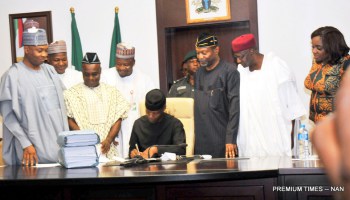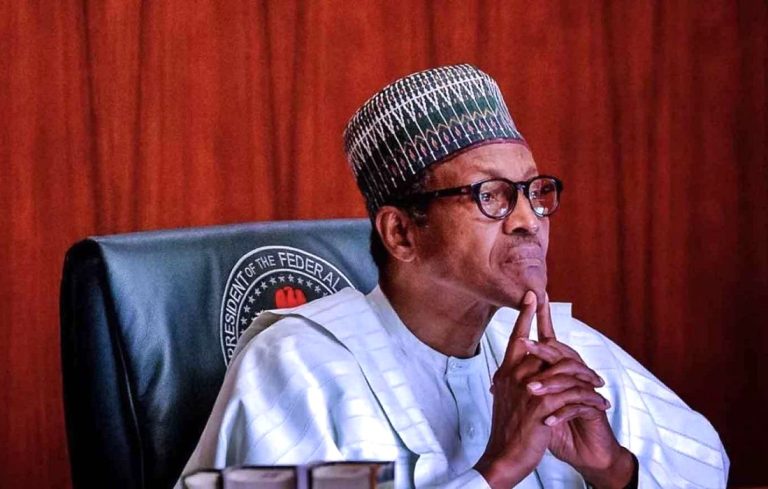Acting President Yemi Osinbajo on Monday finally signed the 2017 Appropriation Act into law in the presence of the principal officers of the National Assembly and other top government officials.
The budget, christened: ‘Budget of Economic Recovery and Growth’, has a revenue projection of N5.08tn and an aggregate expenditure of N7.44tn. The projected fiscal deficit of N2.36tn is to be financed largely by borrowing.
Shortly after signing the document into law at the Presidential Villa, Abuja, Osinbajo described the budget as an important milestone in the nation’s Economic Recovery and Growth Plan that was unveiled in April by President Muhammadu Buhari.
He commended the Ministry of Budget and National Planning for preparing a good document, and the National Assembly for the rancour-free manner in which it was passed.
Osinbajo, however, explained that he delayed the signing of the budget because of the disagreements the Executive had about the changes introduced to the document by the Legislature.
He said the Executive’s stance was that the changes would affect some of the Federal Government’s priority programmes and would make implementation difficult or even impossible.
Osinbajo explained that he finally decided to sign the document after the leadership of the National Assembly gave a commitment to reinstate the budgetary allocations for all the important Executive projects, such as the standard gauge railway projects, the Mambilla power project, the Second Niger Bridge and the Lagos-Ibadan Expressway, among others, which the lawmakers had reduced to fund some of the new projects they introduced.
He noted that the reinstatement would be by way of an application for virement by the Executive, which the lawmakers had agreed would be expeditiously considered and approved.
The acting President stated, “The final presentation and the signing of the budget has been considerably delayed. This was largely due to disagreements we had about the changes introduced to our 2017 budget proposals by the National Assembly. The Executive took the view that the changes fundamentally affected some of our priority programmes and would make implementation extremely difficult, and in some cases, impossible.
“I must say that the entire leadership of the National Assembly led by the Senate President and the Speaker adopted a commendably patriotic and statesmanlike approach to our engagements on resolving these critical issues.”
Osinbajo added that during the discussions with the leadership of the National Assembly, it was resolved that the nation should return to a predictable January-to-December fiscal year.
Describing it as a particularly important development, he said it was in accord with the financial year of most private sector companies, underscoring the crucial relationship between the government and the private sector.
To this end, Osinbajo said on the understanding that the Executive would be submitting the 2018 budget proposals to the National Assembly by October this year, the leadership of the National Assembly had committed to working towards its passage into law before the end of 2017.
He said the budget he signed into law reflected the government’s commitment to ensuring strong linkage between the ERGP and the annual budgets.
Osinbajo also replied those who had been expressing concerns over the nation’s rising debt profile, saying the borrowings were still within sustainable limits.
He stated, “Let me assure those who have expressed concern about the growing public debt that we are taking several actions to grow government revenues as well as plug revenue leakages.
“This is because, notwithstanding the fact that our borrowings are still within sustainability limits, we are determined, in the medium term, to reduce our reliance on borrowings to finance our expenditures.”
The acting President explained that the nation’s economy was already showing signs of a gradual recovery as growth was headed towards a positive territory.
He noted that the first quarter Gross Domestic Product growth of -0.52 per cent compared favourably with -2.06 per cent in the first quarter of 2016.
He added that inflation was declining to 17.24 per cent from 18.74 per cent as of May 2016, while the external reserves were now $30.28bn as of June 8, 2017, up from $26.59bn on May 31, 2016.
Osinbajo added, “We are also gradually instilling confidence in our exchange rate regime. This improvement in the GDP growth and other macro-economic indicators are largely attributable to our strategic implementation of the 2016 budget as well as stronger macroeconomic management and policy coordination.
“To demonstrate our commitment to following through our Economic Recovery and Growth Plan, the 2017 budget allocates over N2tn to capital expenditure, principally infrastructure.
“For instance, we are committing over N200bn to improve transport infrastructure such as roads and rail; over N500bn for investments in works, power, and housing; and N46bn for Special Economic Zone projects to be set up in each geopolitical zone.”
The Acting President said the signing of the budget would trigger activities in the domestic economy, which would lead to job creation and more opportunities for employment, especially for the youth.
He said it was because of the reality that government alone could not achieve the goal of delivering inclusive growth that the 2017 budget provided opportunities for partnerships with the private sector.
The National Assembly had on May 9 passed the budget estimates submitted by the President last December.
CULLED FROM: punchng.com



